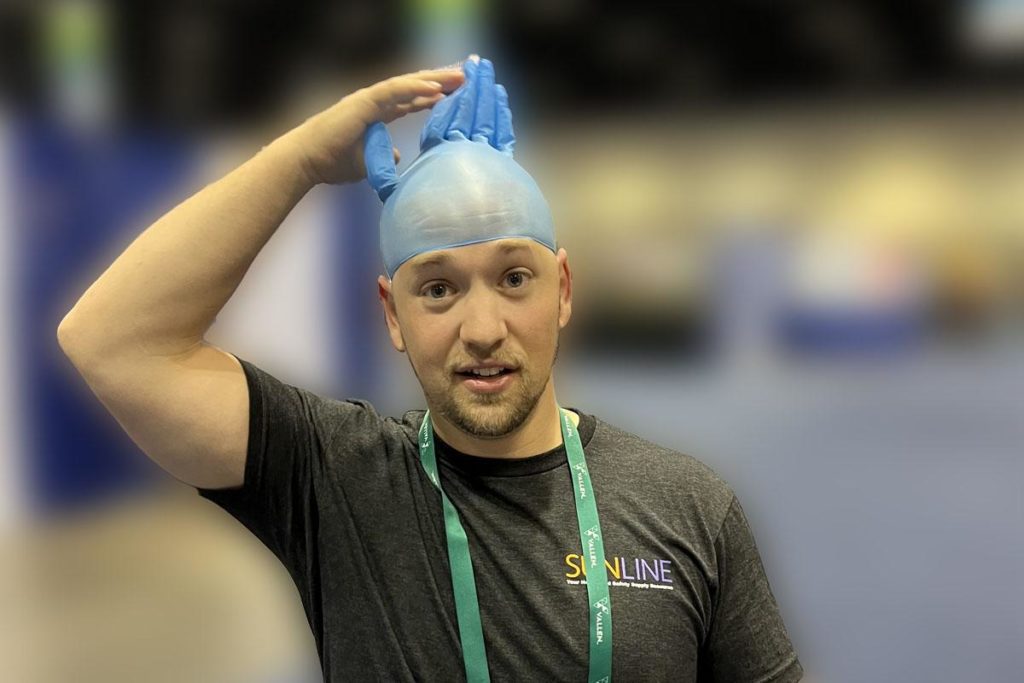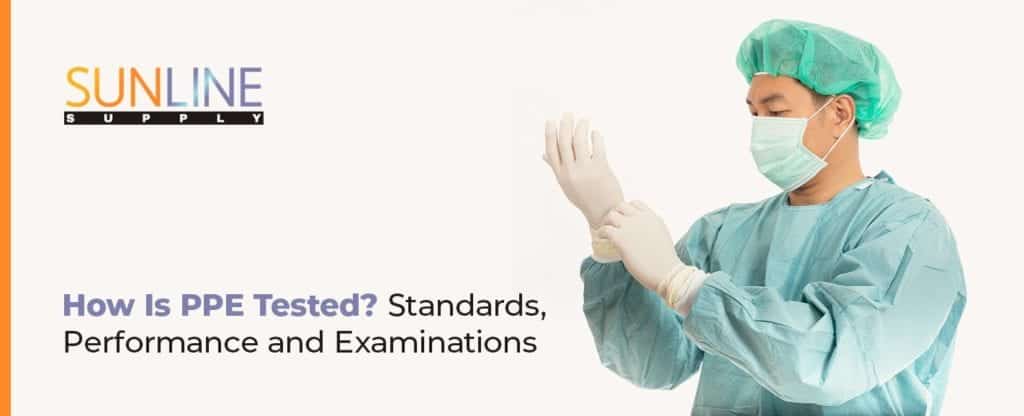
How Is PPE Tested? Standards, Performance and Examinations
Personal protective equipment (PPE) is gear individuals wear to protect themselves from illness or injury on the job. PPE includes objects such as masks, gloves, face shields and gowns, which create a barrier between the person wearing them and hazardous materials or infectious agents. Employees working in the health care, construction, food and drink, education and gas and oil industries can all benefit from PPE.
Not all types of PPE are equal, though. To prove PPE effectively creates a barrier between the wearer and a hazard, independent testing labs must approve it as part of a certification and examination process. If you need PPE for your team, it’s essential to understand what is part of the examination process and how to choose PPE that meets the right standards.
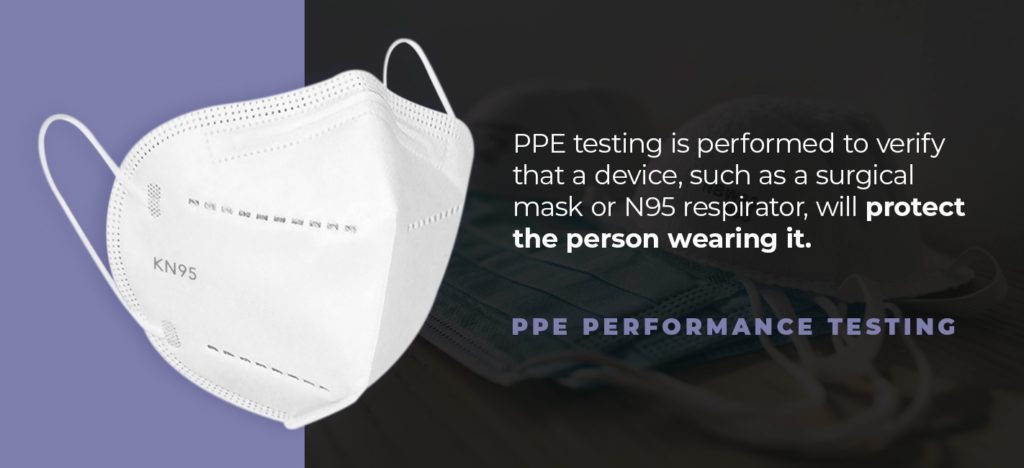
What Is PPE Performance Testing?
The goal of PPE testing is to verify that a device, such as a surgical mask or N95 respirator, will protect the person wearing it. The specific tests a piece of equipment undergoes will depend largely on the intended use of the device. The level of risk to the individual who will wear the PPE also influences the appropriate tests.
In the U.S., PPE for use in a medical or health care setting needs to meet the standards developed by the National Institute for Occupational Safety and Health (NIOSH).
NIOSH certifies and approves respirators, including N95 masks. A respirator doesn’t have to undergo an approval process or otherwise prove that it meets NIOSH’s standards. But respirators that do earn certification from NIOSH can go on sale as approved devices.
The agency expects companies that manufacture PPE to follow these to maintain a consistently high-quality product. The practices and regulations also guide PPE testing, ensuring the devices meet accepted standards. Some of the criteria for PPE testing include:
- Filtering capacity
- Leak protection
- Resistance to tears
- Fluid resistance
Manufacturers that follow these regulations and practices offer companies a level of assurance that the PPE is effective and safe to use.
Why Use Certified and Tested PPE?
PPE can protect workers from hazards and diseases, but only if it can do the things it claims to do. During the COVID-19 pandemic, some companies attempted to capitalize on the increased demand for PPE by marketing and selling untested, uncertified products. In some cases, the counterfeit PPE claimed to be NIOSH certified, though it was not.
There is a risk of harm in using untested PPE, as there is no way to verify that the devices do what they claim to do, such as filter out particles or protect against the transfer of bodily fluids. Whether your company needs the PPE to protect workers from infectious diseases or from exposure to other hazardous substances, the devices must be able to provide the level of protection they claim to offer.
Often, it’s easy to tell if PPE has received certification. In the case of respirators, the mask itself will have an approval label printed on the filtering facepiece, as well as an approval label on or within the packaging. Counterfeit respirators will lack these labels, or will have labeling with misspellings and other errors.
Sunline Supply’s Testing
The COVID-19 pandemic introduced the need for change at many companies, not only in the U.S., but also around the world. In response, Arnold’s Office Furniture launched Sunline Supply, a division dedicated to providing customers with top-quality, safe and effective PPE. We are keeping in front of ever-changing supply chain regulations and avoid the chance of delayed shipments from a manufacturer.
Leaders from our company have toured the factories we work with and have seen the products up close. We’ve compared dozens of different PPE offerings from numerous brands, allowing us to provide you with the best-quality devices.
Who Performs PPE Testing?
The companies that manufacture PPE devices don’t carry out testing, nor do the companies that distribute the products. Instead, third-party, independent laboratories conduct the tests. The labs that perform PPE testing are neutral and don’t profit from the sale of the devices. Their neutrality is crucial to ensuring the tests performed and the results achieved are valid.
Independent Testing Labs
Independent testing labs offer an unbiased review of information. Many labs perform quality control and assurance testing on a wide range of products, not just PPE. The lab tests aim to confirm that the products do not pose a risk of harm to the people who will use them and assure that the products do what they claim to do.
Typically, testing at an independent lab will put a device through strenuous conditions. The scenarios created in a lab are likely to be more challenging and rigorous than those a device would encounter in the real world. By confirming that a piece of PPE can withstand even the worst of conditions, a lab can verify that it would do its job effectively under typical conditions.
Passing the appropriate lab tests usually means PPE is ready to earn third-party certification, giving the purchaser of the equipment peace of mind that it will offer the protection needed.
How to Tell If PPE Has Undergone Testing and Received Certification
To avoid purchasing a counterfeit product that won’t offer the protection you need, verify that the PPE you are considering has undergone testing and earned certification. There are several ways to tell this.
In the case of N95 respirators, you can examine the masks themselves to see if you detect any signs that they are counterfeit. Counterfeit respirators might have any of the following:
- Ear loops instead of straps that go around the head
- No marks or approval number on the filtering facepiece respirator
- “NIOSH” misspelled
- Decorative features, such as ribbons or sequins
Another way to determine if PPE has completed testing and certification is to ask the manufacturer or distributor to provide evidence of testing by a third-party lab and any resulting certifications. For respirators, you can look at NIOSH’s list of approved products.
What Are the PPE Assessment Requirements?
To function correctly, PPE must do and be several things. It needs to offer the right level of protection to the wearer. It should also be durable and sanitary.
An independent lab will conduct a variety of tests in an attempt to measure each of those things. For example, to assess how much protection a device offers the person wearing, the lab test might gauge the strength of the material used to make the equipment. For vinyl or latex gloves, the evaluation might assess how much force it takes to tear the material.
The lab test might also look at the construction of the PPE to get a sense of how long it will last or how effective it will be for the wearer. For example, part of the quality assurance test of a face shield might involve inspecting the headband to make sure it’s adjustable and to ensure it will hold up to daily wear and tear.
Tests also assess how sanitary a device is and whether it’s suitable for multiple uses, or if it’s single-use only.
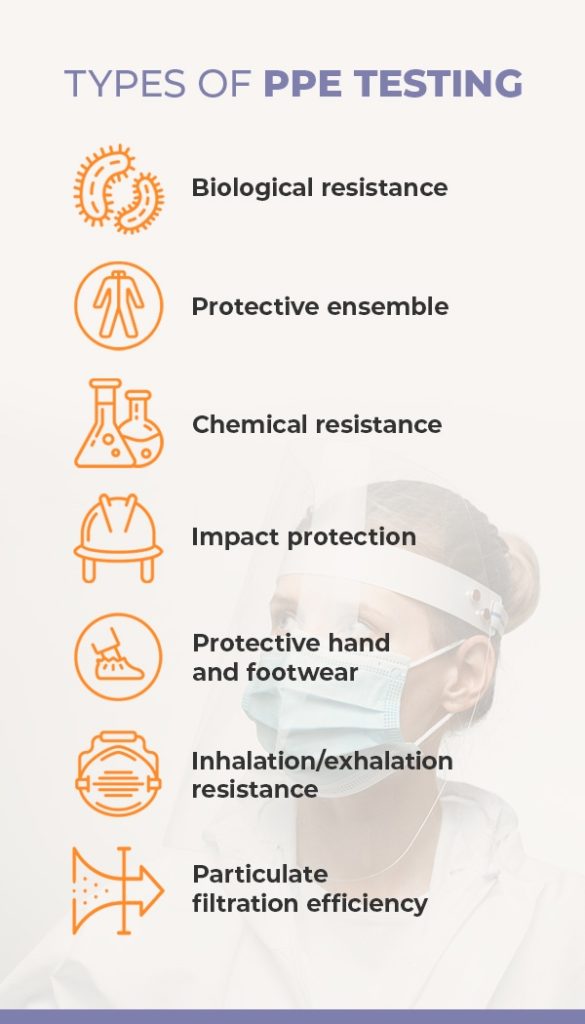
Types of PPE Testing
The type of tests a lab performs on PPE can vary based on the devices’ intended use and the level of risk to the person who will use them. Some types of equipment, such as N95 masks, will need to undergo more rigorous testing than others, as they will see use in more hazardous circumstances or in situations where the likelihood of exposure to a pathogen is high.
- Biological resistance: Employees working in health care depend on PPE that protects them from biological agents, such as viruses and bacteria. Biological resistance testing analyzes how well a material can withstand penetration by pathogens. It can also assess whether the material has any resistance to particular types of bacteria or viruses.
- Protective ensemble: In some cases, an individual might need to don PPE from head to toe. Protective ensemble testing evaluates how well all the PPE a person might have to wear protects against substances, such as chemicals, that might splash onto the garments. It can also measure how well the apparel protects against rain or heat. In addition to measuring the PPE’s splash resistance, this type of test also determines how well materials can resist tearing, abrasions or bursting. Some tests also measure the flammability of the materials.
- Chemical resistance: Chemical resistance testing is similar to biological resistance testing. Instead of analyzing how well a material can resist penetration by a biological agent, the tests examine how well the material resists penetration by a chemical. For example, the test might evaluate whether a particular chemical substance dissolves or melts away a vinyl glove or a plastic gown.
- Impact protection: Manufacturers often perform impact testing on PPE that protects against falls and blows. For example, evaluating a helmet can determine how much force it can absorb when it strikes a hard surface.
- Protective hand and footwear: Testing of protective gloves and footwear usually includes measuring the ergonomics of the equipment, slip resistance and mechanical risks.
- Inhalation/exhalation resistance: Inhalation/exhalation resistance measures how easy or difficult it is to breathe through a filtering facepiece respirator.
- Particulate filtration efficiency: Particulate filtration efficiency measures the percentage of particles a respirator can effectively filter from the air a wearer breathes. For example, N95 respirators earn their name because they filter out at least 95% of the particles that flow through them.
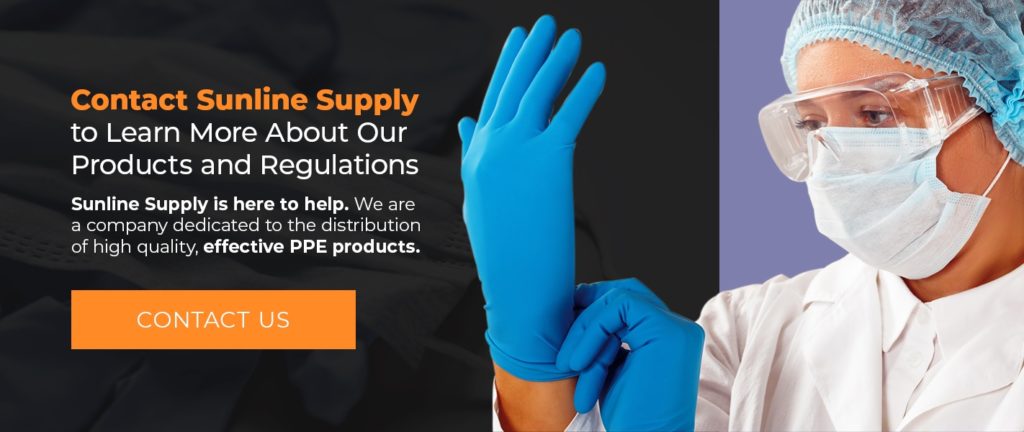
Contact Sunline Supply to Learn More About Our Products and Regulations
From gloves to surgical masks and from isolation suits to shoe covers, you need equipment that will keep your team members safe from harm and create a healthier work environment. Sunline Supply is here to help. We are a company dedicated to the distribution of high-quality, effective PPE products. We only work with manufacturers we trust because we understand how vital it is for you to protect those you work with and care about. To learn more about our products and the methods we use to vet all our manufacturers, contact us today.
